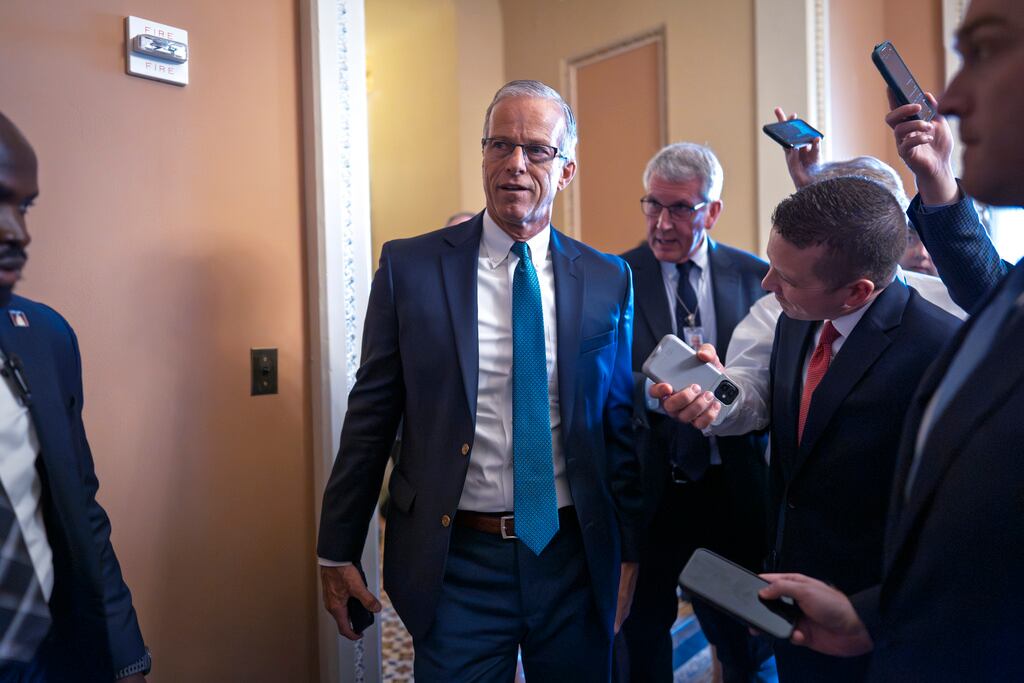By Joey Cappelletti, Kevin Freking, and Lisa Mascaro of the Associated Press
WASHINGTON—As they scramble to pass President Donald Trump’s combination of tax breaks, spending cuts, and strengthened deportation funds before his July 4 deadline, Senate Republicans narrowly passed a crucial procedural step in a dramatic late Saturday session.
After a heated meeting, the final score was 51-49, with Vice President JD Vance available to break the tie if necessary. Voting stalled for hours as senators who were still opposed gathered for talks, resulting in tense scenes in the chamber. Ultimately, two Republicans joined all Democrats in opposing the resolution to move forward with discussion.
There is still a long weekend ahead of us.
Republicans have had a number of political and policy setbacks, but they are still utilizing their congressional majorities to ignore Democratic opposition. Proposals to cut spending on food stamps, Medicaid, and other programs in order to help pay for the extension of almost $3.8 trillion in Trump tax breaks have not been supported by all GOP senators.
The White House issued a statement of administrative policy before of the anticipated roll call, stating that it strongly supports the passage of the law that implements important components of the president’s agenda. Trump and Republican senators posted on social media about Trump’s visit to his Virginia golf property on Saturday.
Senate Majority Leader John Thune, R-S.D., stated that it is time to see this measure through to completion.
However, as the day went on, billionaire Elon Musk blasted the bundle, calling it completely harmful and ridiculous.
The most recent Senate draft measure will seriously hurt our nation strategically and eliminate millions of American jobs! said in a statement by the former senior Trump aide.
Senators are anticipated to work through the hours of all-night discussion and amendments in the coming days after the 940-page bill was unveiled just before midnight on Friday. The bill would return to the House for a last round of votes before it could make it to the White House if the Senate could pass it.
In the face of nearly unanimous Democratic opposition, leaders must have the support of nearly every lawmaker due to the slim Republican majority in the House and Senate. Sen. Rand Paul of Kentucky and Sen. Thom Tillis of North Carolina voted no.
New York Senate Democratic Leader Chuck Schumer claimed that Republicans are hurrying to complete the plan before the public is fully aware of its contents because they unveiled it in the middle of the night. It would take hours for him to demand that the Senate read the entire document.
Make-or-break moment for GOP
Trump’s party, which has largely based its political resources on his main domestic policy agenda, may make or break the session over the weekend. Trump is urging Congress to come to an agreement and has warned GOP stalwarts to get in line.
The legislation is a complex and ambitious set of Republican priorities. Fundamentally, it would extend many of the tax benefits from Trump’s first term that would otherwise expire by the end of the year if Congress does nothing, potentially raising taxes for Americans. The package would dedicate $350 billion to national security, including Trump’s massive deportation goal, and offer new advantages, such as no tip taxes.
However, there is also dissension among Republicans over the cuts to Medicaid, food stamps, and green energy subsidies, which Oregon Senator Ron Wyden, a prominent Democrat, claimed would be a death sentence for the country’s solar and wind businesses.
Republicans are depending on the cutbacks to make up for the lost tax income, but some members believe the cuts are excessive, especially for Medicaid recipients. Conservatives, meanwhile, are calling for more drastic cuts because they are concerned about the country’s debt.
Tillis, who claimed to have discussed his concerns with Trump late Friday, declared on Saturday that he could not support the package in its current form, mostly because he claimed the health care reforms would force his state to make difficult choices, such as removing Medicaid coverage for hundreds of thousands of people.
After setbacks, Republicans revise some proposals
The Senate lawmaker examined the bill to make sure it adhered to the stringent Byrd Rule, which was named for the late Sen. Robert C. Byrd, D-W.Va., which caused the release of that draft to be postponed. Unless a provision receives 60 votes to overcome objections, it essentially prevents policy topics from being included in budget measures. In a Senate where Democrats united against Trump’s bill and the GOP holds a 53-47 advantage, it would be a difficult task.
Republicans had a string of losses after a number of their proposals—such as transferring food stamp expenditures from the federal government to the states or dismantling the Consumer Financial Protection Bureau’s funding structure—were found to be in violation of the regulations.
However, Republicans have swiftly updated and reintroduced such measures in recent days.
A plan to reduce the Medicaid provider tax, which had encountered parliamentary obstacles and opposition from a number of senators concerned about the future of rural hospitals, is included in the final draft. The updated version creates a $25 billion fund to support rural hospitals and providers and delays the implementation of those cuts. Sen. Josh Hawley, R-Mo., who had resisted the cuts, promised to do all in his power to ensure that they never materialize.
According to the impartial Congressional Budget Office, the House-passed version of the measure would result in at least 3 million less people being eligible for food help and an additional 10.9 million individuals losing their health care. The Senate draft, which calls for more drastic cuts, has not yet been evaluated by the CBO.
According to the CBO, the House version would cost the poorest Americans $1,600, while top earnings would receive a tax cut of roughly $12,000.
SALT dispute shakes things up
Legislators from New York and other high-tax states have made the so-called SALT provision—a deduction for state and local taxes—a primary goal, and the Senate includes a compromise on the matter, but it is still up for debate.
A few Republicans proposed to raise the SALT cap from the existing $10,000 annual cap to $40,000. A five-year maximum of $40,000 is included in the final draft.
That is still too generous, according to a number of Republican senators. That wouldn’t be enough, according to at least one House GOP holdout, Rep. Nick LaLota of New York.
Trump s deadline nears
With the intention of being on call to return to Washington, House Speaker Mike Johnson sent his coworkers home for the weekend. However, House GOP backing was unclear once the Senate text was made public. Rep. David Valadao of California, a Republican, expressed his opposition.
___
This report was written by Ali Swenson and Matthew Daly of the Associated Press.






